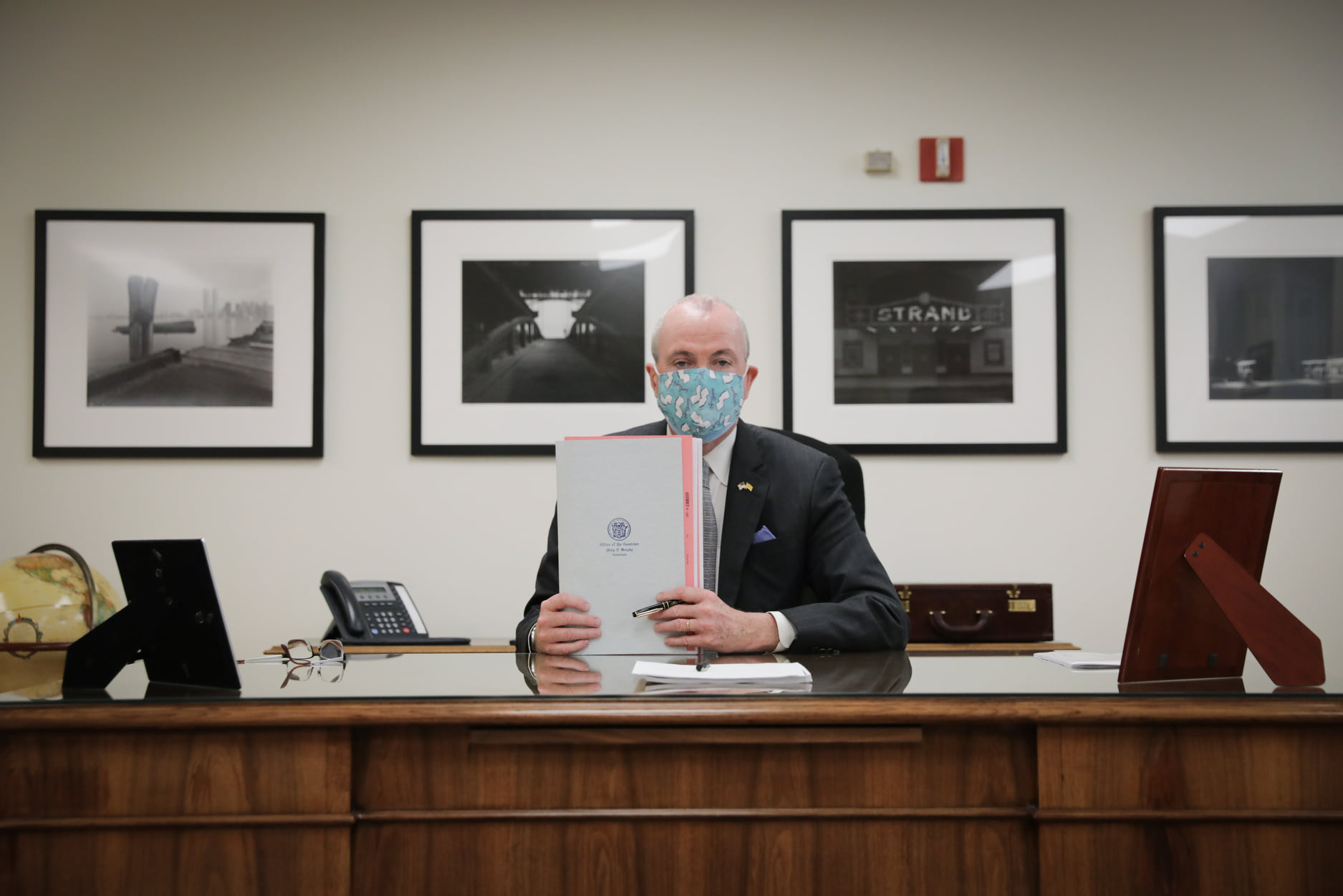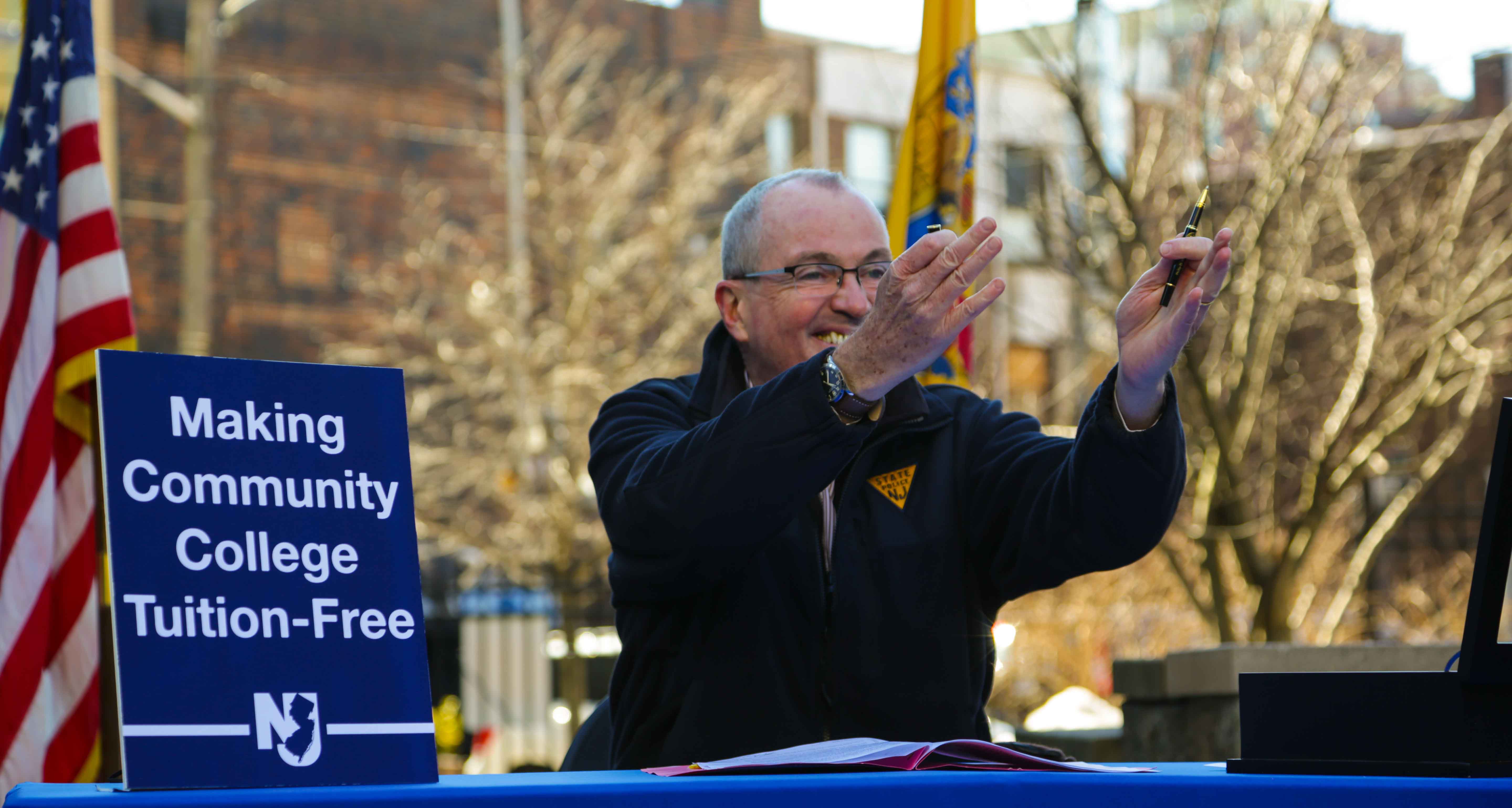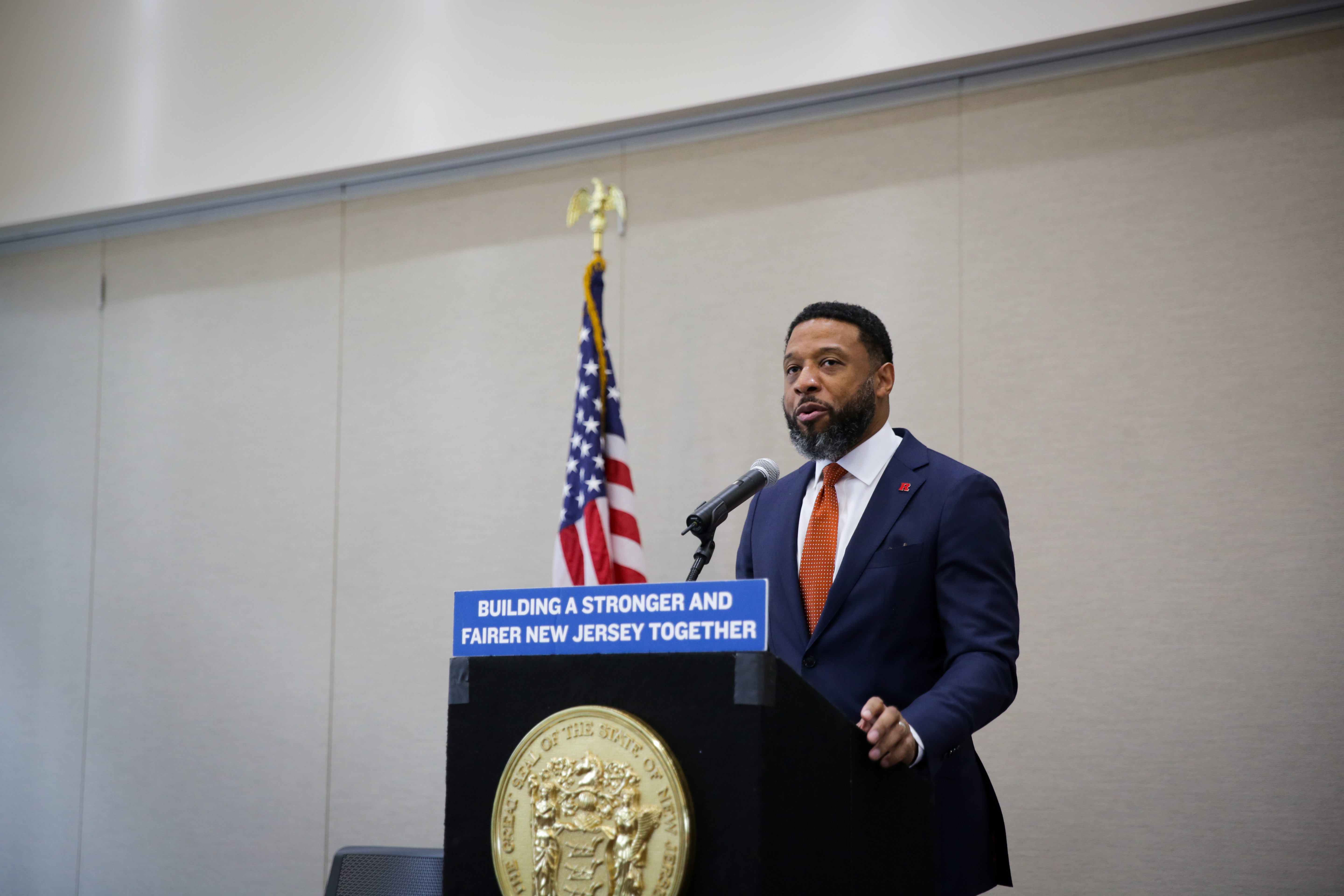This Week in NJ: February 26th, 2021

Governor Murphy Presents Fiscal Year 2022 Budget: Investing in a Stronger, Fairer, and More Resilient Post-Pandemic New Jersey
Governor Phil Murphy delivered his fourth annual budget address on Tuesday, outlining a responsible spending proposal for Fiscal Year 2022 (FY2022) that includes critical investments to help New Jersey emerge from the pandemic stronger, fairer, and more resilient, while making a full pension payment for the first time in more than a quarter of a century, providing the highest level of school funding in history, delivering direct tax rebates to over 760,000 middle-class families, and providing $200 million in relief for small businesses.
“This budget lives up to our stronger and fairer mission,” said Governor Murphy. “Stronger to come out of the pandemic with an economy that works for every New Jersey family. Fairer to help families and small businesses hit hard and left behind in the pandemic's brutal wake. This budget will continue to stabilize property taxes for hardworking families. This budget will continue the hard work of moving forward – not only from the pandemic – but from years of neglect. Our problems weren’t created overnight and, frankly, they won’t be fixed overnight. But I know that brighter days lay ahead.”
The proposed FY2022 budget makes good on the Governor’s promise to public employees by including an additional $1.6 billion to meet the goal of contributing 100 percent of the Actuarially Determined Contribution (ADC) to New Jersey’s pension system a year earlier than initially planned. The proposed $6.4 billion pension payment, which includes contributions from the State lottery, would mark the first time the State has made a full contribution since FY1996.
The State has been on a 1/10 ramp up plan as it works its way up to meeting the full pension contribution and was initially slated to contribute 90 percent of the full contribution this year. The Governor’s decision to make a 100 percent contribution a year early will substantially reduce the State’s obligation in the coming years, saving taxpayers $861 million over the next 30 years. The combined pension contributions by the Murphy Administration in four years will roughly total an unprecedented $18 billion, which is $9.4 billion more than the prior Governor contributed over two terms.
The $44.83 billion spending proposal assumes 2.4 percent growth in total revenue and includes a sizable surplus of $2.193 billion, just under five percent of budgeted appropriations and dwarfing the average of the previous administration. Revenue projections have improved in part due to record high stock markets, federal stimulus that directly aided individuals and businesses, as well as what economists describe as a K-shaped recession, which has seen middle and high-income households recover more quickly while low-income households have continued to struggle.

Governor Murphy Signs Historic Adult-Use Cannabis Reform Bills Into Law
Governor Phil Murphy signed historic adult-use cannabis reform bills into law, legalizing and regulating cannabis use and possession for adults 21 years and older (A21 – “The New Jersey Cannabis Regulatory, Enforcement Assistance, and Marketplace Modernization Act”) and decriminalizing marijuana and hashish possession (A1897). The Governor also signed S3454, clarifying marijuana and cannabis use and possession penalties for individuals younger than 21 years old.
“Our current marijuana prohibition laws have failed every test of social justice, which is why for years I’ve strongly supported the legalization of adult-use cannabis. Maintaining a status quo that allows tens of thousands, disproportionately people of color, to be arrested in New Jersey each year for low-level drug offenses is unjust and indefensible,” said Governor Murphy. “This November, New Jerseyans voted overwhelmingly in support of creating a well-regulated adult-use cannabis market. Although this process has taken longer than anticipated, I believe it is ending in the right place and will ultimately serve as a national model.
“This legislation will establish an industry that brings equity and economic opportunity to our communities, while establishing minimum standards for safe products and allowing law enforcement to focus their resources on real public safety matters,” continued Governor Murphy. “Today, we’re taking a monumental step forward to reduce racial disparities in our criminal justice system, while building a promising new industry and standing on the right side of history. I’d like to thank the Legislature, advocates, faith leaders, and community leaders for their dedicated work and partnership on this critical issue.”
“At long last, New Jersey is turning the page on our previous treatment of marijuana use,” said Dianna Houenou, incoming Chair of the New Jersey Cannabis Regulatory Commission (CRC). “I am excited to get to work building on the successes of the medical program and standing up the adult-use cannabis industry. It’s an honor to be part of this historic movement in New Jersey.”
“Today, Governor Murphy signed legislation into law that reflects the will of New Jerseyans who made their voices loud and clear last November when they voted to legalize recreational cannabis use for adults,” said U.S. Senator Robert Menendez. “As always, the needs of our state will guide my work in the U.S. Senate, and I stand ready to advocate for federal policies that respect and protect the ability of local enterprises and law-abiding citizens to do business in a cannabis marketplace that is transparent, equitable, safe and accountable.”
“The failed War on Drugs has systematically targeted people of color and the poor, disproportionately impacting Black and Brown communities and hurting families in New Jersey and across our nation,” said U.S Senator Cory Booker. “Today is a historic day, and I applaud Governor Murphy, the legislature, and the many advocates for racial and social justice whose leadership is ensuring that New Jersey is at the forefront of equitable marijuana legalization policy. I will continue to work with my colleagues in the Senate to end the federal marijuana prohibition so we can finally begin healing the wounds of decades of injustice.”
“This is a historic reform that will have a real-life impact on social justice, law enforcement and the state’s economy,” said Senate President Steve Sweeney. “We can now move forward to correct social injustices at the same time that marijuana is made legal for adults. This will launch a new cannabis industry with the potential to create jobs and generate economic activity at a time when it is desperately needed. The decriminalization law is the most sweeping measure of its kind in the country and is a groundbreaking step in our continued effort to make criminal justice reforms that are fairer and more effective. This will help reduce the racial disparities and social inequities that have long plagued our criminal justice system.”

Governor Murphy Signs Landmark Legislation to Permanently Establish the Community College Opportunity Grant Program
Fulfilling his promise to make tuition-free community college a reality, Governor Phil Murphy signed A4410, permanently establishing the Community College Opportunity Grant Program (CCOG), which will allow qualified students to attend any New Jersey community college without tuition or educational fees.
“For far too long, higher education has been out of reach for countless New Jerseyans due to its high cost,” said Governor Murphy. “Today’s bill signing underscores our continued commitment to college affordability, ensuring that our young people and working adults have the opportunity to earn post-secondary degrees and advance their promising careers.”
“Today represents a huge win for college affordability and a transformative moment in our state’s history. In the years to come, CCOG will continue offering thousands more eligible students equitable access to a college education for free,” said Dr. Brian Bridges, Secretary of Higher Education. “To emerge stronger and fairer from the COVID-19 pandemic, we are investing in future generations today by expanding affordable options to ensure students’ lifelong success.”
“New Jersey now sends a clear message: county college is tuition-free for students with family incomes of $65,000 or below,” said David Socolow, Executive Director of the New Jersey Higher Education Student Assistance Authority (HESAA). “Governor Murphy has enabled HESAA to back up that promise by filling students’ remaining financial aid gaps with more than 25,000 Community College Opportunity Grants since the spring 2019 semester. The impact of this commitment reaches still further, by making an up-front, tuition-free price guarantee that enables tens of thousands of additional students to focus on their postsecondary education without concern about paying the tuition sticker price. Many students can now consider enrolling in college with full confidence that their entire county college tuition will be covered by the State of New Jersey. By raising awareness that college is more affordable, we can encourage more students to pursue courses of study that will enhance their lives and careers here in the Garden State.”

Governor Murphy and Acting Department of Education Commissioner Allen-McMillan Visit Thomas Jefferson Middle School in Fair Lawn to Discuss Historic Pre-K Through 12 Investments in Fiscal Year 2022 Budget Proposal
Governor Phil Murphy and Acting Education Commissioner Dr. Angelica Allen-McMillan visited Thomas Jefferson Middle School in Fair Lawn to highlight the $18.1 billion in pre-K through 12 school aid funding in the Governor’s Fiscal Year 2022 (FY2022) budget proposal.
The proposed FY2022 budget furthers the Governor’s historic commitment to education, with $578 million in additional K-12 school aid and nearly $50 million in additional preschool funding. When paired with additional investments in Extraordinary Special Aid and stabilization aid, the FY2022 budget increases school funding by $700 million. Governor Murphy’s four budgets will have increased direct pre-K through 12 spending statewide by nearly $1.5 billion. School districts will be able to use State funds in conjunction with federal resources to address COVID-19-related learning loss, stand up mental health programs, train educators, and remediate buildings, among other uses.
“The budget proposal unveiled this week furthers our commitment to ensuring that school districts have the resources they need to the unique needs of their students and educators, an especially critical priority as districts manage challenges caused by COVID-19,” said Governor Murphy. “I have long believed that investments in our students are investments in the future of our state, and now more than ever I am proud that our students continue to be a priority.”
“The Governor’s budget will help provide necessary resources to help schools navigate the countless challenges they have faced throughout the global pandemic,” said Acting Department of Education Commissioner Dr. Allen-McMillan. “Ultimately, the beneficiaries of our commitment to education will be the students, from the youngest preschoolers to high school graduates.”

Governor Murphy, Secretary Bridges Announce $29.5 Million to Support College and University Students Amid COVID-19 Pandemic
Governor Phil Murphy and Secretary of Higher Education Dr. Brian Bridges announced that $29.5 million in federal funding will be available to New Jersey’s institutions of higher education amid the ongoing COVID-19 pandemic to support the goals of the State Plan for Higher Education through a competitive challenge grant and address student food insecurities across college campuses.
About $28.5 million in funding from the U.S. Department of Education through the Governor's Emergency Education Relief (GEER II) Fund will be awarded to New Jersey’s public and public-mission private institutions that receive state operating aid to implement vetted best practices that increase college completion, address barriers to student success, and develop sustainable systemic reforms. Another $1 million will be awarded to public institutions to combat food insecurity among students.
“As we continue to fight the pandemic and look toward recovery, it is critical to provide immediate relief and support for our higher education institutions to meet the challenges brought by COVID-19,” said Governor Murphy. “Now more than ever, this necessary funding will provide the financial assistance for our colleges and universities to better serve our students and continue propelling them toward their fullest potentials.”
“The COVID-19 pandemic only intensified the challenges many students already faced in the pursuit of higher education, including college affordability and food insecurity, making our State Plan priorities even more critical,” said Secretary of Higher Education Dr. Brian Bridges. “New Jersey’s higher education sector will experience long-term effects from the pandemic. However, we remain committed to ensuring students have equitable access to postsecondary education now and in the future, and are equipped with the supports needed to increase their likelihood of completion. This funding allows us to further that commitment. We look forward to continuing to explore innovative ways to strengthen higher education supports and carry out our student-centered vision.”
“Colleges are often overlooked as places where you might find students struggling for their next meal, but food insecurity is very real and prevalent on New Jersey college campuses,” said Speaker Craig Coughlin. “The Hunger-Free Campus Grant Program will become another tool in our fight against hunger throughout the state. I implore all eligible colleges and universities to apply to receive the assistance they need to help college students facing food insecurity.”
 Official Site of The State of New Jersey
Official Site of The State of New Jersey
